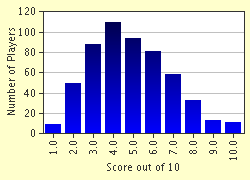Quiz Answer Key and Fun Facts
1. Whence did Christie take the title of 'Taken at the Flood'?
2. Where did the title of 'Postern of Fate' come from?
3. The title of Christie's novel 'The Pale Horse' provides a vital clue as to the nature of the murders contained therein. Where did she get the title?
4. One of her most popular novels, 'The Mirror Crack'd from Side to Side', takes its title from a well-known poem - but which one?
5. Dame Christie made enthusiastic use of nursery rhymes in choosing titles for her books. Which of these 'playroom' titles tells us nothing about either the characters or the plot?
6. 'By the Pricking of My Thumbs', another Tommy and Tuppence mystery, is one of Christie's most chilling stories. It deals with a hidden room, a horrific murder and pure, cold-blooded insanity. Which theatrical source gave her the title?
7. Christie took a phrase used several times in the Book of Ecclesiastes as the title of another of her novels. Which novel is this?
8. A Christie mystery which begins 'In my end is my beginning...' (a line also used as the ending of the poem 'East Coker' from 'The Four Quartets' by T.S. Eliot) takes its title from a poem by William Blake. What is the poem?
9. The Miss Marple book, 'The Moving Finger', is a tale of blackmail. A mysterious letter-writer points the accusing finger at several people in the book. Which source provides the title's inspiration: 'the moving finger writes; and, having writ, moves on'?
10. True or false: The title of 'Sad Cypress' is taken from a tragedy by William Shakespeare.
Source: Author
alkmene
This quiz was reviewed by FunTrivia editor
agony before going online.
Any errors found in FunTrivia content are routinely corrected through our feedback system.

